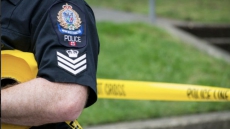Canada's national police force is taking part in the massive effort to identify dozens of Canadians killed in last week's plane crash in Iran.
While no RCMP officers are currently on the ground in Tehran, where the Ukrainian passenger jet was shot down by the Iranian military, a spokeswoman said the force is co-ordinating the crucial work of gathering physical material that will eventually be used to identify the remains of the 57 Canadian victims.
"On-site disaster victim identification assistance from Canada has not been requested at this time," Catherine Fortin said in a statement. "The RCMP is currently creating DNA profiles here in Canada to assist Iran with Canadian victim identification."
Much of that work, Fortin said, will involve gathering samples from family members of the plane crash victims. Of the 176 people killed in the crash, federal officials have said 138 were bound for Canada.
The Canadian Press has independently confirmed at least 89 victims with ties to Canada, many of them students and professors returning after spending the December break visiting relatives in Iran.
Fortin said the RCMP, which operates the Ottawa bureau of the global law enforcement organization Interpol, began supporting victim identification efforts at the request of the equivalent office in Tehran.
She said the RCMP will work with local police forces to contact relatives of Canadian plane crash victims.
"Some family members may therefore be asked to provide biological samples to assist with the identification of the victims," Fortin said, adding those samples would then be used to generate a DNA profile that would later help identify remains.
Dr. David Sweet, professor of dentistry at the University of British Columbia and Interpol's former chief scientific officer for disaster victim identification, said such material forms a vital part of all efforts to put names to those killed in large-scale tragedies.
He said the profiles generated in Canada will be compared to fragments of teeth, jaw bones and other tissues most likely to have survived the crash, which took place on Jan. 8 when the plane was hit by at least one surface-to-air missile fired by the Iran's Islamic Revolutionary Guards.
But Sweet said officials around the world may face challenges in their efforts to identify the dead due to conditions on the ground in Iran.
"The home country has not requested assistance initially and may not have had an established response plan or a team that could respond quickly with all of the needed infrastructure and ... expertise to do things effectively," he said.
Iran is not alone in this regard, Sweet said, noting that while Canada has emerged as a global leader in the field of victim identification, the international community at large is not well-equipped to respond to such situations.
"There's training and capacity-building that's necessary over a period of time, and nobody worries about that," he said. "It's death, and you don't want to turn your mind to that sort of thing under normal circumstances, and then all of a sudden when this happens and you realize that you really need someone, where do you find them?"
Efforts to identify victims, who also included 11 Ukrainians, 17 people from Sweden, four Afghans, four British citizens, as well as Iranians, will be unfolding against an increasingly tense political backdrop.
Foreign Affairs Minister Francois-Philippe Champagne was in London on Thursday to meet with representatives of the countries that lost citizens in the crash. At the end of the meeting, Champagne and the other participating foreign ministers demanded that Iran accept full responsibility for the downing of the plane and pay compensation to the victims' families.
The diplomats also called for Iran to respect families' wishes on repatriating their loved ones' remains, full access for consular officials and investigators, and an independent and credible criminal investigation.
Canada, which does not have an embassy in Iran, has demanded official status in that country's investigation of the crash. Two Canadian investigators are in Iran as part of an international team, and Ottawa has requested their participation in the probe be formalized.
Meanwhile, Canada has also voiced support for a decision by European leaders to trigger a section of their 2015 nuclear agreement that could bring back European sanctions against Iran. That move resulted in Iran's president issuing threats aimed at European soldiers in the Middle East.


